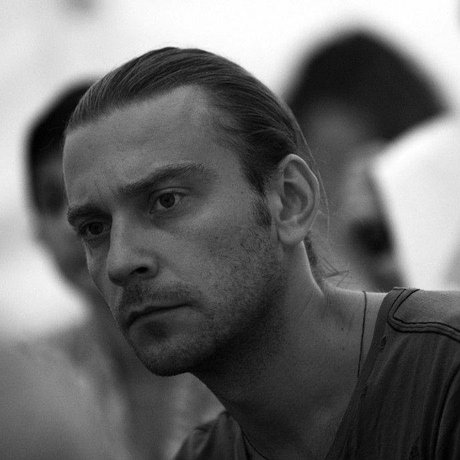Mikhail Durnenkov is a playwright and screenwriter. He was born in 1978, in Tynda, Russia. In 1995 he moved to Tolyatti and there he became one of the most significant members of this city’s New Drama school movement. It is impossible to imagine contemporary Russian theatre without this movement.
Mikhail Durnenkov started writing when he was 22 together with his brother Vyacheslav who also is one of most influential playwrights of today’s Russia. In 2003 they together wrote a play “Cultural layer” which was selected by The Moscow Times website as one of 15 decade defining plays. It is about an apartment and its tenants of present, past and future hanging out together. It wasn’t very popular but it got attention to Tolyatti’s cultural life and its artists.
After five years of writing together with his brother, Mikhail started signing his plays alone. He often is participating and lecturing in workshops all around the world. Also he used to teach documentary theatre in various universities in Moscow.
Mikhail has worked as a plumber, engineer, TV journalist. Various experiences in life helps him to create different characters, from Stanislavsky himself in “I don’t believe” to explorers of the Arctic in “On the Edge of the Earth,” the very first BBC World play, written in Arctic during an expedition in which Mr. Durnenkov participated. Durnenkov has graduated Cinematography institute in Moscow (VGIK). Since then he is writing not only for theatre but for films as well. He has also tried himself as a film actor.
He has worked in Teatr.doc, theatre in Moscow which was established by Mikhail Ugarov and Yelena Gremina. In 2014 he was protesting annexation of Crimea and was arrested. After this M. Ugarov was laughing that soon there will be not a single person in Teatr.doc who hasn’t been tried in court. M. Durnenkov, who was released after a few hours in jail, said "I'm fine and I'm going home now. I'll have something to tell [my son] Matvei someday. I was thinking — I'm an artist and, in principle, I should sing. But history and the times have prepared for me the role of a crow. All I can do is squawk. There is no other art right now but squawking. And in some sense, in the sense of unborn flourishing gardens that we could be cultivating, this is very sad." M. Durnenkov has shared a video from police car in which people started singing a song by a band NOL “A man and a cat”
[Lyrics: A man and a cat cry beside the window.
The gray rain drips right down the glass.
An ambulance drives up to the man and cat –
The poor man's brains have snapped.]
Before that, in early 2010s when arrests of Russian entrepreneurs and opposition politicians began, Durnenkov reminisced about reading dissident authors Alexander Solzhenitsyn, Varlam Shalamov and Andrei Sinyavsky in his youth. He said he always asked himself one question after reading their books: How would he act in a similar situation? “And before our very eyes this country is literally turning into that country, the one in those books, and that question I used to ask myself in my youth is growing more and more timely,” he shared.
Plays by M. Durnenkov are being produced not only in Russia but also in Europe – Germany, United Kingdom, Finland, Belarus and elsewhere. His satirical play „Drunks“, written with his brother, was produced in Royal Shakespeare Theatre Company. This play is about small town’s politics and what it means to please everyone. Ilya, a soldier who came back from Chechnya, is taken in the fight for power when his hometown is threatened to be destroyed.
Mikhail Durnenkov is also interested in classics. He has written contemporary version of F. Dostoyevsky’s “Gamblers”. This new all-female version is a story of women who live in the world where there is no mercy and who gamble, hustle, cheat, drink, swear, sing and dance. And never apologize for it.
In 2016 director Yana Ross has produced his play “Lake” which was presented in Vilnius, Lithuania as a part of theatre festival “Sirens”.
One of the most interesting plays by Durnenkov is “The war has not yet started”. It reveals that war mostly is happening not on the streets but just next to us – in our homes, our streets, our hearts. In twelve short modern fables, Durnenkov explores the fears and strangeness of our daily lives – sexual gamesmanship; what to do with our ageing parents; those lying politicians; tension at the airports; those lying journalists; finding ‘the one’. 'You see all these people in the subway with icy cold eyes. Burning inside. It's either gastritis, or their souls, or God knows what. They look like they could pounce at any moment, tear you apart and eat you alive.' A darkly funny, kaleidoscopic look at contemporary Russia on the brink, this surreal black comedy sees everyday people fighting everyday wars.




